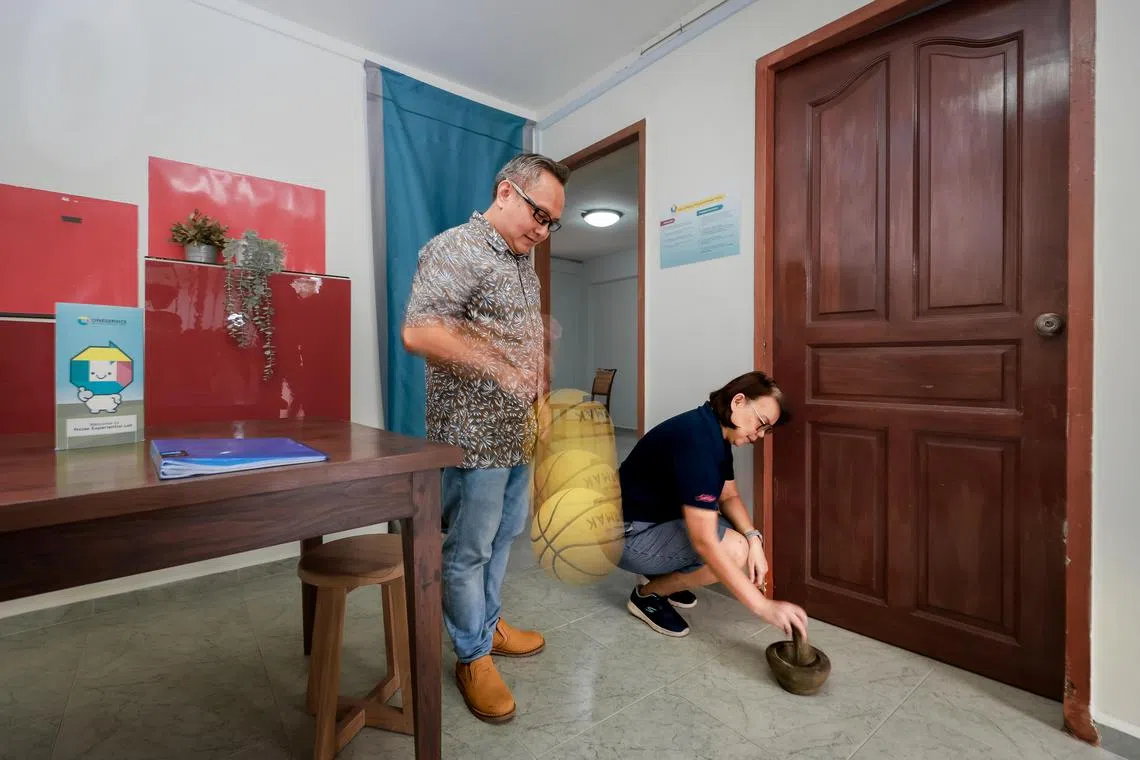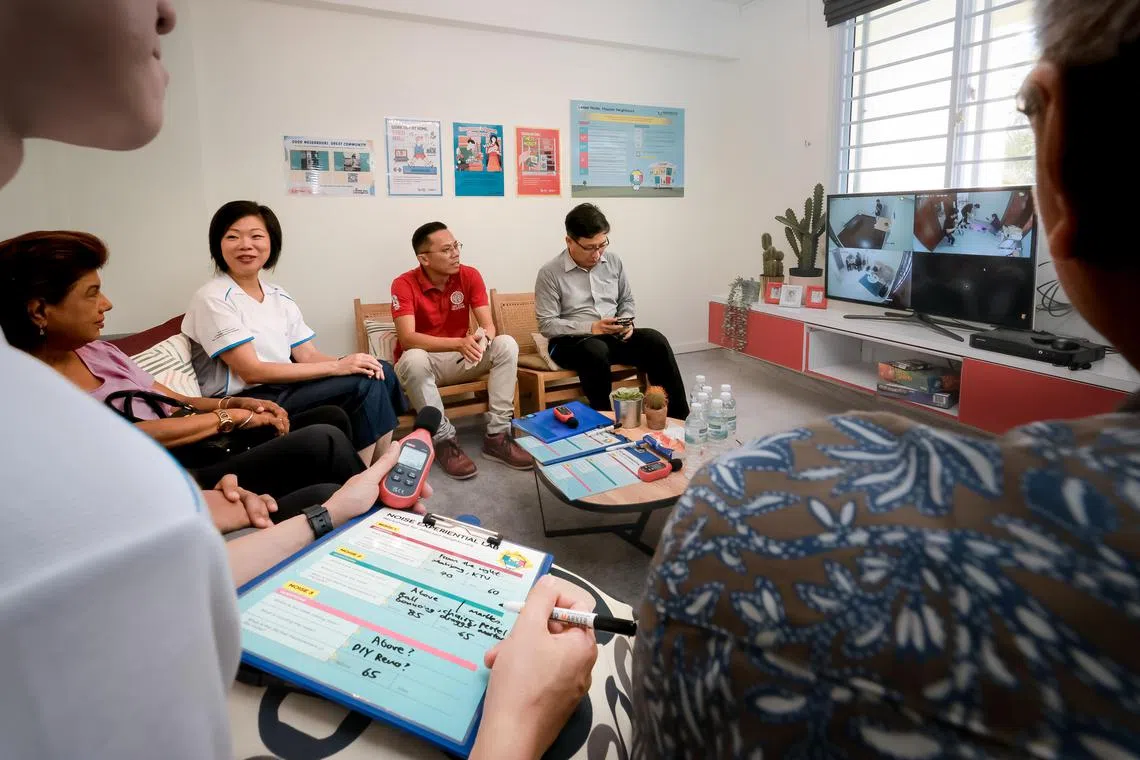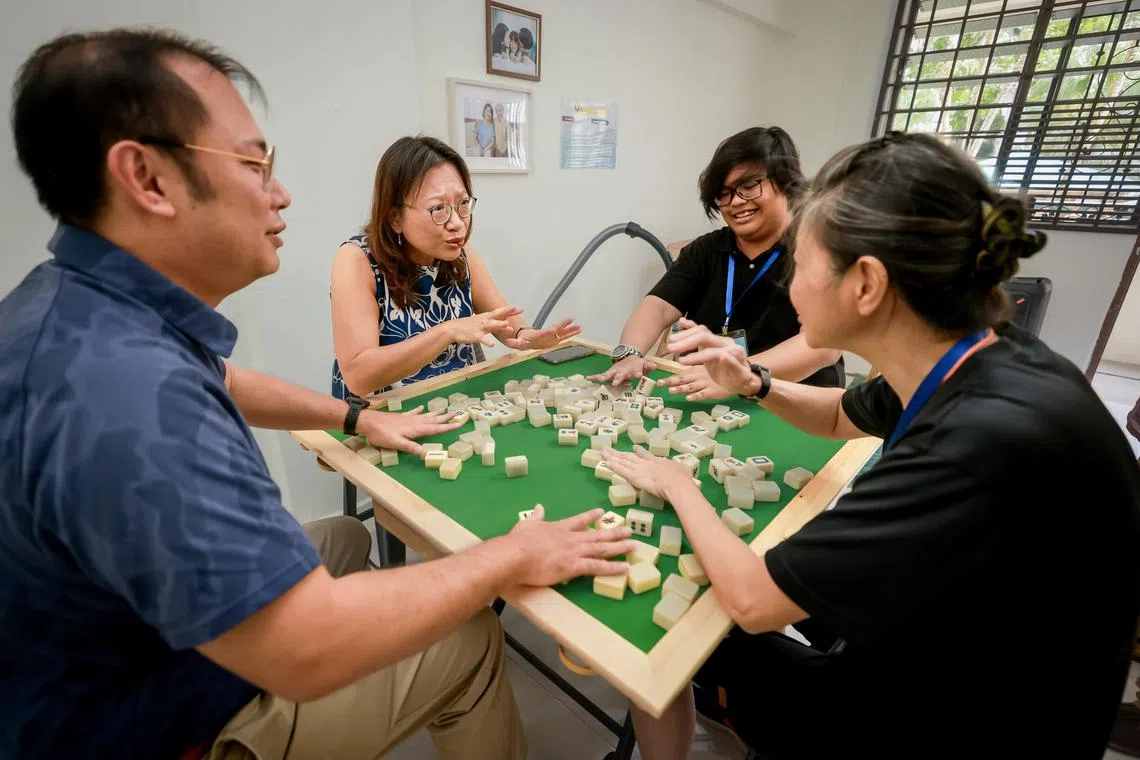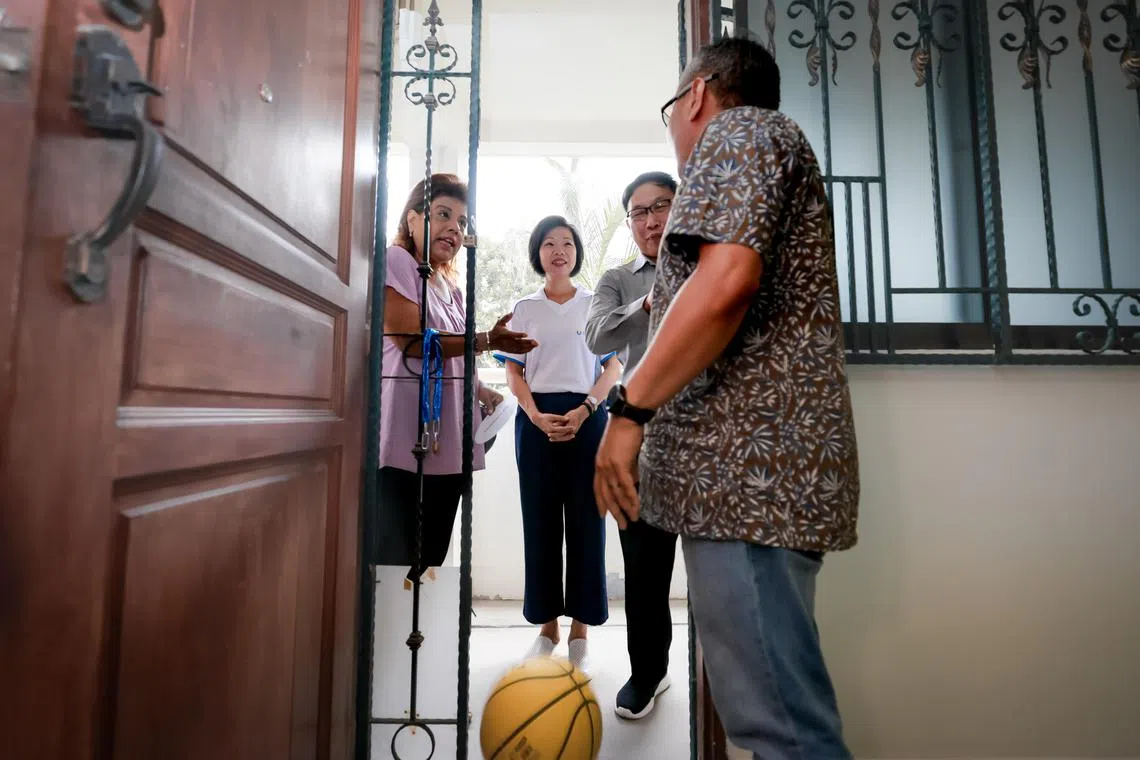New lab in vacant HDB block puts visitors in shoes of residents who are disturbed by noise
Sign up now: Get ST's newsletters delivered to your inbox

“Neighbours” bouncing a ball and making pounding noises at the new noise experiential lab in Tanglin Halt.
ST PHOTO: GAVIN FOO
Follow topic:
SINGAPORE – In a vacant Housing Board block in Tanglin Halt, 16 flats across four floors have been converted into a noise experiential lab.
At the lab, which will be open to the public from Saturday, visitors will have an immersive role-playing experience to understand the impact of noise due to everyday actions – from dragging furniture to doing home workouts to pounding spices – on fellow residents. They will also learn how they can minimise the inconvenience caused by these noises.
The lab at Block 36 Tanglin Halt, which opens till Dec 15 by registration only, requires visitors to take on the role of a resident affected by noise or one producing the noise.
Each session will last an hour and 20 minutes, and can accommodate two groups of eight participants.
Group sizes are flexible and can be adjusted according to participants’ needs, said the Municipal Services Office (MSO), which operates the lab on the first four floors of the block.
The MSO, which comes under the Ministry of National Development (MND), improves the Government’s coordination and delivery of municipal services.
The vacant block is one of those in the estate identified for the Selective En bloc Redevelopment Scheme
At a second-floor unit with an elaborate living room set-up, visitors role-playing as the affected “residents” will get to experience first-hand the loud noises that their “neighbours” produce, and watch closed-circuit television footage of what they are doing in their flats on a television.

Senior Minister of State for National Development Sim Ann (second from left) and guests role-playing as “residents”. They are listening to noises made by “neighbours” while watching closed-circuit television footage of the neighbours.
ST PHOTO: GAVIN FOO
In nearby units, visitors assigned noise-making roles will produce a variety of sounds.
These include loud karaoke singing, shuffling mahjong tiles, dragging heavy furniture and home renovation work.
The affected residents will then be asked to identify the location of specific units producing these noises and be guided through mediation processes that vary for different noise scenarios.
Some suggestions include encouraging the neighbours to stop dragging their furniture and alerting them to home renovation work in advance.
Following that, the affected residents will approach the neighbours for a friendly negotiation.
Visitors will not be able to switch roles during their visit. If they wish to do so, they may sign up for another session, MSO said.
The lab will open from 6.30pm to 8pm from Mondays to Fridays, and host five sessions each on Saturday and Sunday from 9am to 8pm. Admission is free, and those who are interested must register at www.go.gov.sg/noiselab
MND said there have been 40 sign-ups so far, after registration opened on Thursday following publicity on the social media channels of MSO’s OneService Community.
The launch of the lab comes after complaints about noisy neighbours surged during the Covid-19 pandemic, when many people worked and studied from home.

“Neighbours”, who are assigned noise-making roles, playing mahjong at the noise experiential lab.
ST PHOTO: GAVIN FOO
In March, Senior Minister of State for National Development Sim Ann announced initiatives to deal with noise disputes, including starting a dedicated unit within MSO for serious cases by the end of 2023.
Speaking to the media at the lab’s launch on Friday, Ms Sim said these measures are in the works, and more details will be made public when ready.
With noise-related complaints at HDB homes remaining high with 27,600 lodged in 2022
“It is also part of good norm setting as well as public education,” she added.
MSO said it hopes to welcome as many visitors to the lab as possible, and it would consider extending the operating hours if there is high demand.
Ms Sim said she took away “surprising insights” from the experience on Friday, as noise can be transmitted in many ways. For instance, some noises may not sound loud to the culprit but could seriously disturb a family several units away, she added.

Senior Minister of State for National Development Sim Ann (in white) role-playing as a resident to negotiate with a neighbour who is bouncing a basketball loudly in his flat.
ST PHOTO: GAVIN FOO
Ms Lela Kaur, 65, a member of the Community Advisory Panel on Neighbourhood Noise, said the lab was an “eye-opening experience”. She had always wondered where the sounds of furniture being dragged came from, since she lives on the topmost floor of a HDB block.
Ms Kaur said she looks forward to applying what she learnt in the lab, to investigate sources of noise and start mediation processes with neighbours.
Some HDB residents The Straits Times spoke to felt the lab would not be an effective solution in mitigating noise problems.
Mr Ang Keet Sin, a 70-year-old hardware shop owner, called it a “waste of time”. He felt that inculcating civic values in young children was more essential than nudging adults to suddenly pick up good habits.
Others, such as student Lavesh Cheyne, were interested in visiting the lab.
Intrigued by the non-confrontational methods of approaching neighbours, the 19-year-old said he wants to experience the simulation to find out how to handle noise-related problems.

